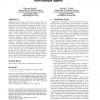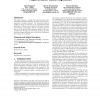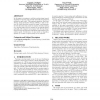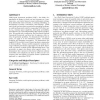135
click to vote
ATAL
2007
Springer
15 years 3 months ago
2007
Springer
For the past few years many new applications are being developed featuring interactive environments populated with autonomous virtual agents capable of acting according to their g...
122
click to vote
ATAL
2007
Springer
15 years 3 months ago
2007
Springer
Modeling crowd behavior is an important challenge for cognitive modelers. We propose a novel model of crowd behavior, based on Festinger’s Social Comparison Theory, a social psy...
137
click to vote
ATAL
2007
Springer
15 years 3 months ago
2007
Springer
Referral networks are a kind of P2P system consisting of autonomous agents who seek, provide services, or refer other service providers. Key applications include service discovery...
133
click to vote
ATAL
2007
Springer
15 years 6 months ago
2007
Springer
Consumers use service selection mechanisms to decide on a service provider to interact with. Although there are various service selection mechanisms, each mechanism has different s...
143
click to vote
ATAL
2007
Springer
15 years 6 months ago
2007
Springer
Integrating contributions received from other agents is an essential activity in multi-agent systems (MASs). Not only must related contributions be integrated together, but the co...
140
click to vote
ATAL
2007
Springer
15 years 6 months ago
2007
Springer
This paper proposes a unified and general framework for argumentation-based negotiation, in which the role of argumentation is formally analyzed. The framework makes it possible t...
148
click to vote
ATAL
2007
Springer
15 years 6 months ago
2007
Springer
The dominant existing routing strategies employed in peerto-peer(P2P) based information retrieval(IR) systems are similarity-based approaches. In these approaches, agents depend o...
142
click to vote
ATAL
2007
Springer
15 years 6 months ago
2007
Springer
Norm-governed virtual organizations define, govern and facilitate coordinated resource sharing and problem solving in societies of agents. With an explicit account of norms, openn...
164
click to vote
ATAL
2007
Springer
15 years 6 months ago
2007
Springer
Multi-Agent Agreement problems (MAP) - the ability of a population of agents to search out and converge on a common state - are central issues in many multi-agent settings, from d...




